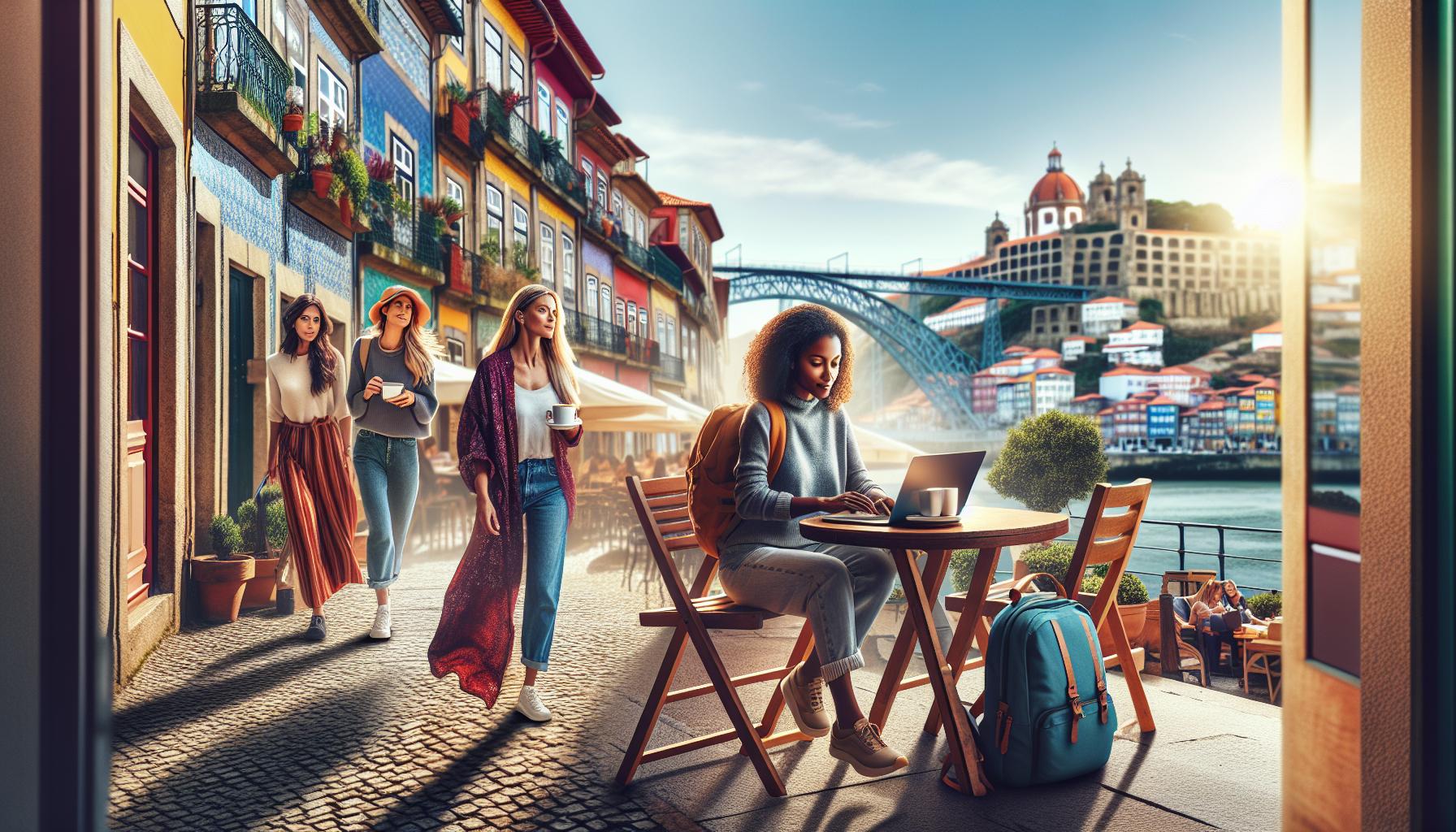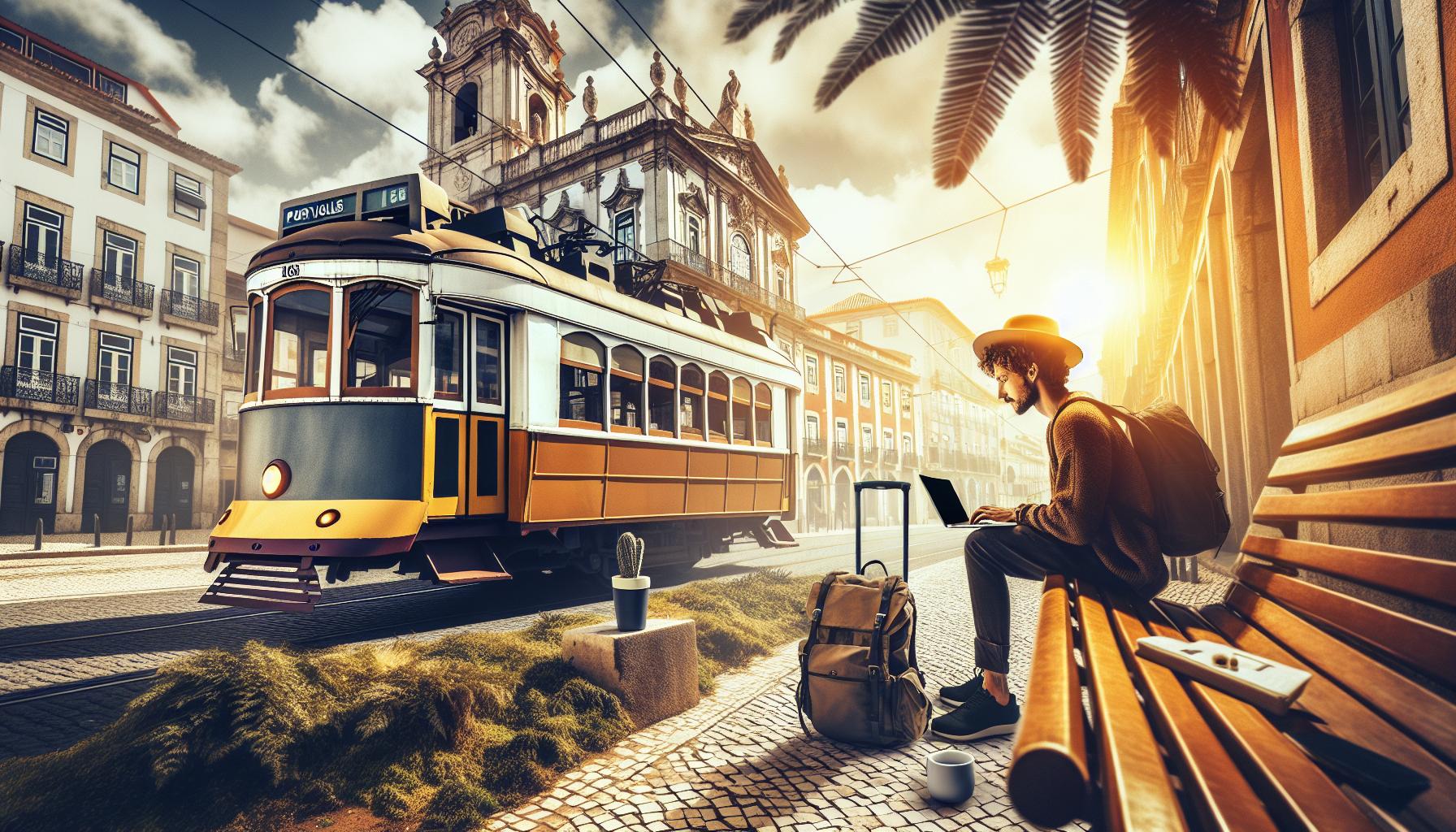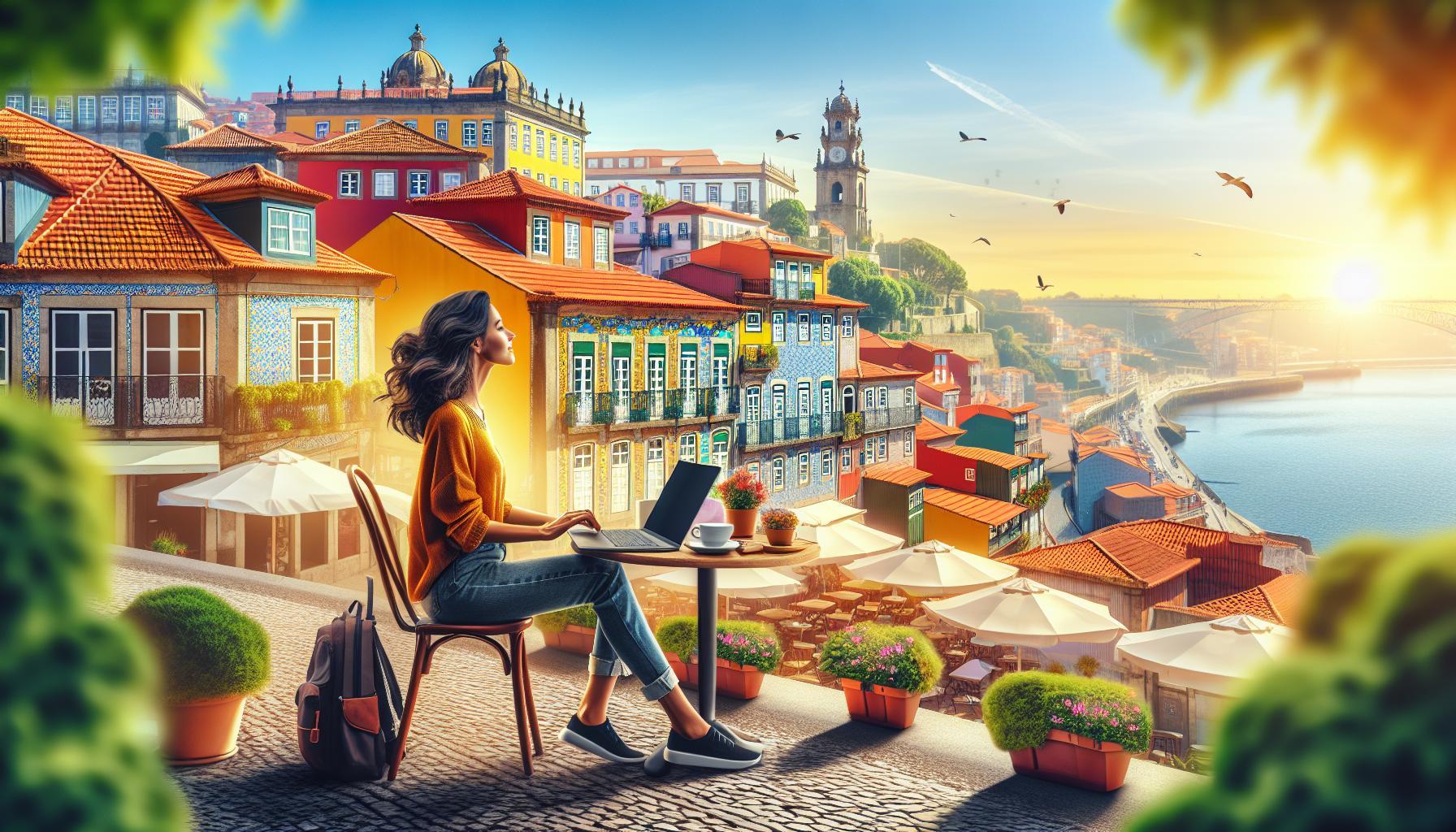As one of Europe’s safest destinations, Portugal has become a beacon of adventure for solo female travelers. With its friendly locals, vibrant culture, and stunning landscapes, exploring this enchanting country offers a unique experience while prioritizing your safety. However, as a solo traveler, it’s natural to have concerns about navigating new environments alone.
Understanding the dynamics of safety in Portugal can empower you to travel with confidence. This guide will highlight essential tips and insights, ensuring you feel secure while immersing yourself in Portugal’s rich history and breathtaking beauty. By addressing common concerns and providing practical advice, we aim to help you embark on your journey with both enthusiasm and peace of mind. So, let’s delve into the essential aspects of traveling safely in Portugal, allowing you to focus on the adventure ahead!
Is Portugal Safe for Solo Female Travellers? Understanding Local Safety Norms
Traveling solo can be an exhilarating experience, and Portugal stands out as a welcoming destination for solo female travelers. The country boasts a relatively low crime rate compared to other European nations, creating a secure environment for those venturing out alone. Many women have reported enjoyable experiences, noting the friendly nature of locals who often go out of their way to offer assistance or guidance, especially in tourist areas. However, understanding local safety norms is essential to navigate unfamiliar territories confidently.
When exploring cities like Lisbon and Porto, it’s helpful to stay aware of your surroundings, particularly in crowded places and popular tourist spots where pickpocketing can occur. Utilize common sense: keep your belongings secure, avoid displaying valuables, and maintain a calm demeanor while traveling at night. Opt for well-lit areas and familiar routes, and be cautious when accepting help from strangers, as intention can vary. Knowing local emergency numbers-such as 112 for general emergencies-can further enhance your safety and peace of mind while roaming these vibrant streets.
While Portugal is generally safe, it’s also wise to connect with fellow travelers and locals, often sharing tips on lesser-known areas and best practices for enjoying the local culture. Engaging in conversations at communal spaces like hostels, cafes, and public transport can provide valuable insights. Social media and travel forums also serve as platforms to search for recommendations and safety tips from other solo female travelers, fostering a sense of community and support.
Embracing the Culture: Tips for Respectful Engagement
Portugal is a treasure trove of rich culture, stunning landscapes, and warm-hearted people, making it a perfect destination for solo female travelers eager to dive into new experiences. Engaging with locals and embracing the culture not only enriches your journey but also fosters deeper connections. To navigate this beautifully diverse country respectfully, consider a few essential tips that can enhance your travel experience while ensuring you are mindful of the cultural nuances.
Understanding the local customs is crucial. For instance, personal greetings often involve a kiss on both cheeks-common in social settings. However, a polite handshake may be more appropriate in more formal contexts. When dining, it is customary to wait for your host to begin, so pay attention to cues around you. These gestures go a long way in showing respect for the culture, which is appreciated by locals. Additionally, learning a few basic Portuguese phrases can open doors and make conversations smoother, as many locals appreciate the effort to speak their language.
Participating in local traditions, such as festivals or market days, offers unique insights into Portuguese life. Prioritize respectful observation; if you’re unsure how to behave, look to others for cues. When visiting religious sites, dress modestly and observe any designated silence or behavior expectations. Before taking photographs, particularly of people or cultural events, always ask for permission, as this shows respect for their privacy.
Additionally, it’s helpful to approach conversations with an open mind and genuine curiosity. Solo travel can sometimes feel isolating, but engaging in friendly dialogue with locals can lead to unexpected friendships. Shared meals, local dance classes, or cooking workshops can provide memorable interactions that deepen your understanding of Portuguese culture.
In essence, engaging respectfully with local customs and communities enriches your travel experiences and creates a layer of connection that transcends tourist interactions, allowing you to travel confidently while savoring the charm of Portugal.
Top Cities and Regions in Portugal for Solo Female Explorers
Portugal’s charm extends beyond its stunning landscapes and rich history; it is also home to vibrant cities that cater to the adventurous spirit of solo female travelers. Exploring these locales not only enhances your travel experience but also provides a sense of safety and community. Here are some of the top cities and regions that offer unique opportunities for solo female explorers.
Lisbon
The capital city is a beacon of culture, featuring colorful neighborhoods like Alfama and Bairro Alto. Lisbon’s excellent transit system, including trams and metro, makes it easy to navigate its hilly terrain. With countless cafes, fado music, and rich history, the city invites exploration. Don’t miss the chance to visit Belém Tower and the Jerónimos Monastery. Consider joining walking tours, which are a great way to meet fellow travelers while learning about the city’s history. The friendly locals often go out of their way to help, which further boosts safety and confidence for solo travelers.
Porto
Famous for its stunning riverfront and port wine, the city of Porto provides a mix of cultural experiences and scenic views. Stroll through the historic Ribeira district, revel in the lively atmosphere at the Mercado do Bolhão, and visit the bookshop Livraria Lello, known for its stunning architecture. Porto is walkable and has a welcoming feel, which makes it ideal for solo adventurers looking to soak in the local vibe. Joining a wine-tasting tour can be an engaging way to both meet new people and deepen your appreciation of the region’s famous port.
Algarve
For those inclined towards beauty and relaxation, the Algarve region is a must-visit. Known for its stunning beaches and picturesque coastal towns like Lagos and Albufeira, it offers ample opportunities for water sports and sunbathing. The region is generally safe, and many accommodations cater to solo travelers. You can easily join group activities such as kayaking or biking tours, which not only provide safe exploration but also foster connections with fellow adventurers.
Sintra
Just a short train ride from Lisbon, Sintra is a fairy-tale town brimming with colorful palaces and lush gardens. Visit the iconic Pena Palace and the Moorish Castle, both of which provide breathtaking views of the surrounding areas. Sintra’s compact size makes it easy to navigate on foot, and the charming streets are filled with quaint shops and cafes, perfect for leisurely afternoons. The welcoming atmosphere makes it an ideal spot for solo female travelers eager to experience Portugal’s enchanting history.
Connecting with other travelers and locals can enrich your journey. Whether enjoying local cuisine at a communal table, participating in art classes, or joining group outings to popular sights, you’ll find that Portugal’s vibrant cities offer countless avenues for engagement. Remember to embrace the adventure that solo travel brings, as each city and region has its unique blend of culture, history, and camaraderie waiting to be discovered.
Navigating Portugal’s Public Transport Safely
Mastering the public transport system in Portugal is essential for solo female travelers looking to explore the country’s diverse offerings safely and confidently. Portugal boasts an extensive and efficient public transport network, including buses, trams, metros, and trains, allowing travelers to easily navigate major cities and picturesque regions alike. With a little knowledge and preparation, you can maximize your travel experience while prioritizing your safety.
Understanding the Transport Network
Portugal’s public transportation system is particularly easy to use, with well-marked signs in English and clear routes. In cities like Lisbon and Porto, public transport options include:
- Buses: A reliable way to cover shorter distances and connect to neighborhoods not served by metro.
- Trams: Iconic in Lisbon, these offer scenic routes, especially the famous Tram 28, which meanders through historic districts.
- Metro: Lisbon’s metro system is safe, frequent, and efficient for getting around the city quickly.
- Trains: Excellent for intercity travel; the Alfa Pendular train connects Lisbon with Porto and other major cities.
For solo travelers, don’t hesitate to ask staff for directions or assistance; they are generally very helpful and accommodating.
Safety Tips for Public Transport
While public transport in Portugal is safe, it’s wise to track certain precautions. Here are some practical tips:
- Stay aware of your surroundings: Keep an eye on your belongings and remain vigilant, especially in crowded areas.
- Travel during peak hours: Whenever possible, opt to travel during busier times, which can provide additional safety through the presence of other commuters.
- Use reputable taxi or rideshare services: If public transport feels daunting late at night, consider using licensed taxis or ridesharing apps like Uber, which operate in major cities.
- Know your route: Familiarize yourself with your destination and transfer points ahead of time to avoid getting lost.
Empowering Navigation
An essential tool for any solo traveler is a reliable navigation app. Google Maps not only provides directions for all types of transport but also offers real-time updates, helping to keep your travel plans smooth. Additionally, consider downloading local transportation apps like Carris for Lisbon or STCP for Porto for easy route planning and timetable access.
By embracing Portugal’s public transport system with a well-informed approach, you can enhance your exploration, enjoy the local culture, and travel confidently as a solo female adventurer.
Finding Accommodations: Best Options for Solo Female Travellers
Finding the right place to stay can significantly enhance your journey through Portugal, especially as a solo female traveler. Whether you’re eyeing the vibrant streets of Lisbon or the coastal charm of the Algarve, options abound to suit your needs and preferences. Considering factors such as safety, location, and social opportunities can make a world of difference in ensuring a comfortable and enriching experience.
One of the safest and most enjoyable options for accommodations is hostels. Not only are they budget-friendly, but many also cater specifically to solo travelers, providing a sociable environment. Look for hostels that offer female-only dormitories or mixed-gender dorms with positive reviews highlighting safety and hygiene. Check platforms like Hostelworld or Booking.com for listings focused on solo female travelers-many hostels in cities like Porto and Lisbon even organize activities, making it easy to meet fellow adventurers while exploring local culture.
If you prefer a bit more privacy, consider guesthouses or boutique hotels, which often provide a cozy atmosphere with personalized service. Areas like Alfama in Lisbon and the historic center of Porto have charming guesthouses that welcome solo travelers and offer unique local experiences. Many of these accommodations include additional services such as guided tours or workshops that can further enrich your stay.
For those seeking an alternative or longer-term stay, platforms like Airbnb can be beneficial. Look for highly-rated properties with glowing reviews, particularly those emphasizing safety features and responsive hosts. Choosing accommodations in well-trafficked neighborhoods provides peace of mind while allowing easy access to local sights, restaurants, and public transport.
Regardless of your choice, always prioritize safety. Perform background checks on your chosen accommodation by reading reviews from previous guests, focusing on comments related to safety and hospitality. The security of the location, including well-lit access points and the presence of staff, can contribute to a stress-free experience. Don’t hesitate to trust your instincts; if a property doesn’t feel right upon arrival, it’s entirely within your rights to seek out alternatives. By carefully selecting accommodations that prioritize safety and comfort, you can travel with confidence, ready to embrace the stunning culture and landscapes that Portugal has to offer.
Staying Connected: Safety Apps and Useful Resources
In today’s tech-savvy world, staying connected while traveling is more crucial than ever, especially for solo female travelers exploring the beautiful landscapes and cities of Portugal. Utilizing the right safety apps and resources can provide peace of mind, helping to navigate the local environment with greater confidence.
Start by downloading apps that aid in communication and navigation. Google Maps is indispensable for both public transport routes and walking directions. Consider using Citymapper if you’ll be in Lisbon or Porto, as it offers real-time public transport information. For communication, particularly if you’re traveling with others or want to share your whereabouts, apps like WhatsApp or Facebook Messenger can keep you connected with friends and family back home.
Safety Apps to Consider
Equally important are apps designed specifically for safety. Here are a few to consider:
- bSafe: This app includes features such as a panic button, location sharing, and a fake call feature to help you out of uncomfortable situations.
- SafeTrek: An easy-to-use app that lets you hold down a button when you feel unsafe; releasing it alerts authorities if you don’t enter a PIN.
- Companion: Provides real-time tracking by allowing friends or family to follow your route, creating an added layer of security.
- Life360: This family locator app allows you to keep tabs on friends and family who are traveling with you, ensuring everyone remains in touch.
Remember to keep your phone charged and easily accessible, particularly when exploring new areas or returning late to your accommodation. Consider carrying a portable charger to ensure you won’t run out of battery while out and about.
Additionally, familiarize yourself with local emergency contacts and resources. Save important numbers such as the local police and emergency services, as well as the nearest embassy or consulate, in your phone. Understanding the local context can also provide insights; for instance, knowing that dialing 112 will connect you to emergency services across the EU.
By harnessing these apps and resources, you can navigate Portugal with greater ease and comfort, ensuring your solo adventure remains as empowering and enriching as it should be. Each step taken with confidence not only enhances your travel experience but encourages an adventurous spirit that thrives in the heart of exploration.
Cultural Sensitivity: What You Should Know Before You Go
Understanding the cultural nuances of Portugal can transform your solo travel experience, making it not only enjoyable but also respectful to the locals. Known for its rich history, warm hospitality, and diverse traditions, Portugal fosters a connection between travelers and its vibrant culture. Engaging with locals in a sensitive manner can help you create memorable interactions and deepen your appreciation for the country’s heritage.
To enhance your cultural sensitivity, start by learning a few basic Portuguese phrases. Greeting someone with a simple “Olá” (Hello) or “Obrigado” (Thank you) can go a long way in expressing respect for their language. Portuguese people value politeness and a friendly demeanor, so don’t hesitate to engage with locals. When dining out, it’s customary to wait for the host to invite you to sit, and thanking them before leaving reflects good manners. Additionally, being aware of dining etiquette, such as keeping your hands on the table (but not your elbows) and finishing everything on your plate, can show your appreciation for local customs.
When visiting religious sites such as churches or cathedrals, dress modestly and be mindful of the sacredness of these spaces. In places like the famous Jerónimos Monastery or the vibrant Basilica da Estrela, observe visitors’ behavior and follow suit-this might include taking quiet steps or refraining from loud conversations. Additionally, some sites may require women to cover their shoulders, so it’s advisable to carry a shawl or scarf as a backup.
Respect for local traditions extends to festivals and public events as well. Portugal is known for its lively celebrations, from the traditional Festas de São João in Porto to the colorful Carnaval in Lisbon. Participating in these events provides a wonderful opportunity to connect with locals, but it’s essential to approach them with an understanding of their significance. If you’re joining a local celebration, familiarize yourself with the customs-such as sharing food or joining in traditional dances-to enrich your experience and avoid unintentional faux pas.
Lastly, while Portugal is generally safe for solo female travelers, understanding and respecting personal space is key. In a culture that values friendliness, it’s essential to gauge how close you get to someone during interactions, especially in bustling markets or tourist areas. Observing how locals communicate can guide you in building genuine connections while maintaining awareness of social boundaries. Embracing these cultural insights will not only enhance your trip but also empower you to engage authentically with the welcoming Portuguese people.
Emergency Contacts and Local Resources for Peace of Mind
In the adventurous journey of solo travel, having access to local resources and emergency contacts can significantly enhance your peace of mind. Portugal, known for its picturesque landscapes and warm hospitality, also offers reliable support systems for travelers. Familiarizing yourself with these resources ensures that whenever unexpected situations arise, you feel confident and prepared.
Start with the basic emergency numbers. For police assistance, dial 112, which is the universal emergency number across Europe. If you find yourself in need of medical help, the same number can connect you to emergency medical services. It’s wise to keep this number handy, as you might never know when you may need it.
Local Resources for Travelers
- Tourist Information Centers: Almost every town and city in Portugal has a tourist information center where you can get maps, brochures, and advice on local attractions. These centers often provide information about safety, events, and local customs that can enhance your travel experience.
- Local Police Stations: Knowing the location of nearby police stations can be helpful. In case of theft or any safety concerns, you can quickly report incidents. Additionally, the presence of local law enforcement allows you to feel secure while exploring.
- Embassies and Consulates: If you encounter significant issues such as a lost passport or legal trouble, knowing the address and contact details of your country’s embassy or consulate in Portugal is essential. They can provide crucial assistance and support for foreign nationals.
- Emergency Health Services: In addition to emergency numbers, familiarize yourself with the local hospitals. Many cities have English-speaking staff, and their services are generally of high quality. Using apps like HealthifyMe can help you locate nearby medical facilities in case of non-emergency needs as well.
Mobile Apps for Safety and Convenience
To further enhance your safety and stay connected while abroad, consider downloading useful mobile apps like:
- MySOS: This app allows you to send out an emergency message with your location to your contacts at the touch of a button.
- Citymapper: It helps navigate public transportation in major cities and can alert you to the safest routes available.
- Google Maps: Always a reliable choice for navigation, it can also highlight nearby emergency services when necessary.
Being prepared with local contacts, emergency numbers, and helpful resources will empower you to navigate your journey in Portugal with confidence. Embrace your solo adventure, knowing that you have the support needed for a secure and enriching experience.
Daytime vs. Nighttime Safety Tips for Exploring Alone
When exploring alone, situational awareness is your best companion, especially in a foreign country like Portugal, where cultural norms and safety practices may differ from what you’re accustomed to. During the daytime, Portugal’s vibrant streets are bustling with life; this lively atmosphere is generally safe, but it’s important to maintain your vigilance. Stick to well-lit areas, especially in more crowded tourist spots such as Lisbon’s Alfama district or Porto’s Ribeira, where pickpocketing can occur amidst the throngs of people. Keep your belongings close and use a crossbody bag to deter any potential thieves.
As the sun sets, it’s wise to adopt a more cautious approach. While urban areas in Portugal are generally safe, nighttime may unveil different dynamics. Choose nightlife spots that are well-populated and preferably recommended by locals or fellow travelers. For instance, Bairro Alto in Lisbon offers a range of bars and cafes but be mindful of your surroundings and avoid isolated streets, especially if you’re alone. Trust your instincts; if a place feels uncomfortable, don’t hesitate to leave. Making use of taxi services or reliable ride-sharing apps like Uber after dark can also significantly enhance your safety, ensuring a direct route back to your accommodation.
Daytime Safety Tips
- Stay in Public Places: Frequent busy streets and popular tourist attractions.
- Keep Valuables Secure: Use anti-theft bags and pockets for important items.
- Remain Aware: Take note of your surroundings and avoid distractions such as excessive phone use.
Nighttime Safety Tips
- Travel with Others: If possible, explore at night with a group or a trusted companion.
- Use Trusted Transport: Opt for taxis or ride-sharing apps to return to your accommodation safely.
- Limit Alcohol Intake: While enjoying Portugal’s nightlife, stay aware of your limits to maintain alertness.
By adopting these safety tips, you can confidently enjoy both the vibrant daytime experiences and the magical ambiance of Portugal at night, empowering you to create unforgettable memories during your solo adventure.
Meeting Fellow Travellers: Ways to Connect in Portugal
For many solo female travelers, connecting with fellow adventurers can transform a journey into a shared experience filled with memorable moments. Portugal, with its welcoming culture and vibrant atmosphere, offers numerous opportunities to meet like-minded travelers. One of the most effective ways to break the ice is through hostels, which often serve as social hubs for those exploring the region. Many hostels in cities like Lisbon and Porto organize group activities such as walking tours, cooking classes, or pub crawls specifically designed to foster social interactions. Booking a stay at a hostel with a friendly common area can lead to spontaneous conversations, dinner plans, or travel tips shared over a glass of local wine.
Establishing connections doesn’t stop at accommodation. Engage with fellow travelers and locals through community platforms and apps tailored to socializing while traveling. Services like Meetup or Bumble BFF allow travelers to find others with similar interests, whether it be hiking, food tasting, or exploring art galleries. Participating in local events or workshops is another avenue to meet people; look for events on platforms like Eventbrite or local Facebook groups that highlight cultural experiences or communal gatherings. Joining a group tour can also facilitate interactions with fellow tourists while providing the added advantage of exploring hidden gems under the guidance of a knowledgeable local.
Another great option is to seek out communal dining experiences, such as sharing a meal at a local restaurant or participating in a food tour. This not only allows you to savor authentic Portuguese cuisine but also opens up opportunities to chat with fellow diners or even make plans to explore more of the region’s culinary delights together.
Lastly, don’t underestimate the power of social media platforms like Instagram or travel-focused forums. Before your trip, you can reach out to fellow travelers who may be in the area or post in travel groups to find potential meet-ups in Portugal. Creating a travel buddy network can provide you with more confidence to venture into the unknown and enhance your overall experience, ensuring that your journey in Portugal is filled with friendship, adventure, and inspiring connections.
Solo Travel Stories: Inspiring Experiences from Other Women
In the heart of Portugal, countless women have embarked on solo journeys, discovering the beauty of its landscapes and the warmth of its people. Each story embodies empowerment and adventure, acting as a testament to the safety and richness of the experience for female travelers. One traveler recounted her unforgettable exploration of Lisbon, where she roamed the streets of Alfama, getting lost in the maze of narrow alleys adorned with colorful tiles. With a map in hand and an open heart, she found herself welcomed at a local café, where the barista took the time to recommend hidden gems, turning a solitary moment into a delightful cultural exchange.
Another inspiring tale comes from a woman who ventured to Porto for a week. Armed with her camera and a spirit of curiosity, she participated in a photography workshop that connected her with fellow creatives from around the world. Together, they captured the picturesque Ribeira District and shared stories over traditional Francesinha sandwiches. By seeking out group activities, she not only felt safe but also formed lasting friendships, proving that shared passions often lead to unexpected connections.
Solo female explorers can enhance their experiences by utilizing social media, as demonstrated by a backpacker who organized a meet-up through Instagram. She posted about her plans to explore the Douro Valley and quickly gathered a group of like-minded travelers. This initiative not only made her feel safer while hiking through the stunning vineyards but also allowed her to forge connections that turned into group outings, making the experience all the more enriching.
Traveling alone in Portugal doesn’t just mean navigating beautiful sights; it also presents opportunities for personal growth. A solo trekker shared her experience of hiking the Rota Vicentina. Amidst breathtaking coastal views, she learned to embrace solitude, finding joy in her own company. Each step along the trail became a reflection of her inner journey, reinforcing the idea that solo travel can be as much about self-discovery as it is about geographical exploration.
These stories serve as a beacon for those considering solo travel, demonstrating that Portugal is not just a destination, but a welcoming embrace for adventurous women. Whether through spontaneous encounters, shared meals, or organized activities, each journey reveals the potential for unforgettable experiences while traveling alone-an invitation to step outside one’s comfort zone and embrace the world with confidence.
Packing Essentials for Safety and Comfort on Your Trip
Packing for a solo journey through Portugal is not just about minimizing your luggage; it’s an essential step toward ensuring your safety and comfort while exploring this vibrant country. Consider that Portugal is often rated as one of the safer destinations in Europe for solo female travelers, yet being prepared can boost your confidence and enhance your adventure. Here’s a selection of vital items to include in your suitcase that will help you travel with peace of mind.
Essential Gear and Equipment
Start with a reliable backpack or travel bag that is secure yet stylish. Look for features like hidden zippers and anti-theft locks which can deter pickpockets. Pack a versatile, lightweight rain jacket-particularly important in the unpredictable coastal areas of the Algarve or during spring and autumn months. Comfortable walking shoes are crucial, as you’ll likely be navigating cobblestone streets in cities like Lisbon or Porto.
In addition, ensure you carry an RFID-blocking wallet or travel pouch. This simple tool protects your cards and personal information from electronic theft. Consider bringing a portable charger, too; staying connected through maps or translation apps can facilitate your exploration and help you navigate new areas effortlessly.
Personal Safety Items
Being proactive about your safety means equipping yourself with practical items. A personal alarm or whistle can be beneficial, providing an added layer of security should you find yourself in an uncomfortable situation. A small first aid kit with essentials like band-aids, pain relievers, and antiseptic wipes is also wise, especially if you’re planning outdoor activities in regions like the Azores.
Feminine hygiene products might not be readily available everywhere, so pack what you anticipate needing. It may also be worthwhile to keep a small stash of snacks, like energy bars, to maintain your energy levels and avoid being vulnerable when searching for food.
Clothing Considerations
When choosing clothing, think about comfort and appropriateness. Lightweight, breathable fabrics are ideal for sunny days, while layers will keep you warm during cooler evenings.
In Portugal, locals often dress stylishly yet casually, so opt for mix-and-match outfits that allow flexibility in your wardrobe. Additionally, a scarf can be a useful accessory, serving both as a fashion statement and a way to cover up in religious sites like the stunning Jerónimos Monastery in Lisbon.
By prioritizing safety and comfort in your packing strategy, you empower yourself to fully immerse in the cultural wonders of Portugal. With the right preparation, your journey will be filled with memorable experiences that remind you how enriching solo travel can be.
Faq
Q: Is Portugal safe for solo female travellers?
A: Yes, Portugal is generally considered safe for solo female travellers. The country boasts low crime rates and a friendly atmosphere, making it a popular destination. Always stay aware of your surroundings and follow local customs to enhance your safety while exploring.
Q: What are the most common safety concerns for solo female travellers in Portugal?
A: Common concerns include petty theft, especially in crowded tourist areas, and ensuring safe accommodation. It’s advisable to avoid poorly lit places at night and be cautious with personal belongings. Staying updated on local safety norms can help you navigate potential risks effectively.
Q: How can solo female travellers stay safe while exploring Portugal?
A: To stay safe, plan your itinerary, keep your phone charged, and share your location with a trusted friend. Use reputable transport options and stay in well-reviewed accommodations, especially in urban areas. Engaging with local communities can also provide insights into further safety tips.
Q: Are public transportation options safe for women travelling alone in Portugal?
A: Yes, public transportation in Portugal is generally safe for solo female travellers. Buses, trams, and trains are well-maintained and frequently used. However, remain aware of your belongings, especially during busy hours, to avoid pickpocketing incidents.
Q: What should solo female travellers know about cultural sensitivity in Portugal?
A: Understanding local customs is crucial for respectful engagement. Dress modestly in rural areas, learn a few Portuguese phrases, and appreciate local traditions. This not only enriches your experience but also helps you connect with locals positively.
Q: How can solo female travellers connect with others in Portugal?
A: Joining group tours, staying in hostels, or attending local events are excellent ways to meet fellow travellers. Consider using social media or travel apps to find local meet-ups or activities where you can connect with other solo female travellers.
Q: Is it advisable for solo female travellers to go out at night in Portugal?
A: While many parts of Portugal are safe at night, it’s prudent to exercise caution. Stick to well-lit areas, travel in groups when possible, and avoid areas known for high crime rates. It’s best to familiarize yourself with the local vibe first.
Q: What emergency contacts should solo female travellers have in Portugal?
A: Familiarize yourself with important local contacts: emergency services in Portugal can be reached at 112. Keep the contact information of your accommodation, local embassy, and a trusted friend handy, along with the locations of nearby hospitals and police stations.
In Retrospect
As you prepare for your solo adventure in Portugal, remember that this vibrant country is not only welcoming but also offers a rich tapestry of experiences just waiting to be explored. Prioritize safety by staying connected, being aware of your surroundings, and using trusted resources for accommodations. Embrace the excitement of wandering through picturesque streets and indulging in local cuisine-Portugal truly has something for everyone.
For further insights, check out our comprehensive guide on top safety tips for solo travelers in Europe and our article on must-visit destinations in Portugal. Don’t hesitate to share your thoughts or experiences in the comments below; your voice matters in our community!
Ready to embark on your adventure? Sign up for our newsletter to receive exclusive travel tips and resources directly to your inbox. Let Portugal inspire your journey-you’re not just traveling; you’re creating unforgettable memories!





